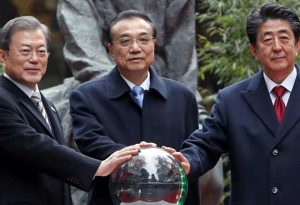 While I have suggested earlier that I don’t think an initial focus on building regional or multilateral institutions is necessarily the best first step in global governance and possibly a means to ‘tone down’ geopolitical competition rhetoric and action, I am now about to contradict myself and this position. For, in the end, there are some obvious regional and international institutions that could encourage collaborative action and push global governance collaboration. And, in fact, I have in mind an obvious one that has – as a current Chinese slang term might well describe it – ‘tang ping’ 躺平 – or ‘lying flat’. It is the Trilateral Summit.
While I have suggested earlier that I don’t think an initial focus on building regional or multilateral institutions is necessarily the best first step in global governance and possibly a means to ‘tone down’ geopolitical competition rhetoric and action, I am now about to contradict myself and this position. For, in the end, there are some obvious regional and international institutions that could encourage collaborative action and push global governance collaboration. And, in fact, I have in mind an obvious one that has – as a current Chinese slang term might well describe it – ‘tang ping’ 躺平 – or ‘lying flat’. It is the Trilateral Summit.
Trilateral Summit, you say. Well, yes, actually. The Trilateral Summit is, periodically, a Summit of the ‘key’ East Asia leaders – South Korea, Japan and most meaningfully, China. A little history here. The Trilateral Summit was first proposed by South Korea in 2004. At that time the three powers met for a separate session at the ASEAN gathering, described as ASEAN plus three. In 2007, at the eighth meeting of the ASEAN plus Three, the leaders agreed to initiate a separate Trilateral Summit. And, in December 2008, the first separate summit was hosted by Japan at Fukuoka. At its initiation the three powers saw the Summit focusing on: closer trilateral relations, the regional economy and disaster relief. One of the regional security issues that has been in front of leaders repeatedly has been the nuclear weapons program of the Democratic Republic of Korea, the DPRK. In the 2018 summit the FT described the leaders’ view of the DPRK nuclear weapons program: “the three leaders agreed to co-operate over North Korea and called for Pyongyang to give up its nuclear weapons completely.” While that agreement may no longer hold, it shows the value of this Summit.
The Summit is not quite a leaders’ gathering. While South Korea is often represented by its President and Japan by its Prime Minister, China has generally been led by its premier, not the President.
In 2011 the Trilateral Summit created a ‘Trilateral Cooperation Secretariat’, a permanent Secretariat in Seoul but with rotating secretariat heads. While the Summit appeared to be set up for annual gatherings that has not been the history of the Trilateral Summit. The Summit failed to gather after 2015, not reconvening again until 2018, the 7th such Summit. And the Summit hasn’t yet met again since 2018. The failure to do so is troubling and is less about geopolitical tensions with China in fact than the periodically tense and poor relations between South Korea and Japan especially over Japan’s actions in Korea before and during World War Two.
But as current President Yoon Suk Yeol expressed at a recent meeting with Japan’s Prime Minister Kishida in May, and reported by the NYTimes: “It’s not something we can unilaterally demand [an apology]; it’s something that should come naturally from the other side’s sincerity,” Mr.Yoon also said said during a joint news conference with Mr. Kishida: “We must abandon the notion that we cannot take a single step ahead for future cooperation until the past history is resolved.”
The presumption admittedly I am making here is that the current improvement of Korea-Japan relations, after a more than a bit of a bilateral ‘deep freeze’, makes the resumption of a Trilateral gathering more likely. Now why is that important? This Summit of these key East Asian powers cuts ‘against the grain’ of geopolitical arrangements in the Indo-Pacific, especially the Quad but also the SCO on the other side. Now ‘China Hawks’, especially in Washington will not be pleased with this summit but it provides a gathering where North Korean belligerence can be discussed and it improves the prospect for a free trade arrangement among these major economic powers. Creating cross-cutting arrangements, as this Summit does, loosens the geopolitical divisions – a good thing in the era of growing US-China competition and tensions. And Japan will protect U.S. present in the Asia-Pacific region. The Biden Administration’s focus on alliances and alignments, especially of the ‘democracy versus autocracy’ type is not nearly as helpful and pluralizing as is this Trilateral Summit.
Focus on global governance! At the Global Summitry Project (https://globalsummitryproject.com) we are.
Here is the latest Substack Post – Alan’s Newsletter. https://globalsummitryproject.substack.com/p/advancing-global-governance-by-revitalizing?utm_source=profile&utm_medium=reader2
Feel free to subscribe
Image Credit: www.orfonline.org

